综合英语教程第三版第二册Unit 3 课文重要词组单词
新编英语教程2第三版第3单元课件
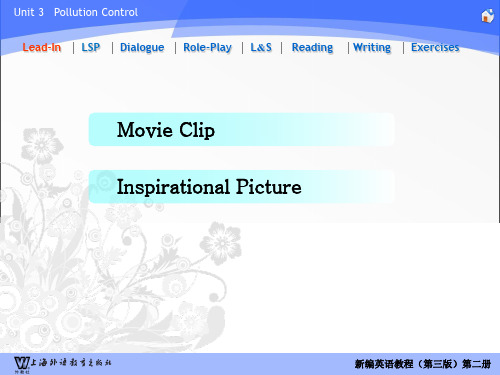
Movie Clip Inspirational Picture
新编英语教程(第三版)第二册
Unit 3 Pollution Control Lead-In LSP Dialogue Role-Play L&S Reading Writing Exercises
新编英语教程(第三版)第二册
Unit 3 Pollution Control Lead-In LSP Dialogue Role-Play L&S Reading Writing Exercises
Inspirational Picture This photo was taken in Linfen, Shanxi province. What does it bring to your mind? Can you describe the picture?
新编英语教程(第三版)第二册
Unit 3 Pollution Control Lead-In LSP Dialogue Role-Play L&S Reading Writing Exercises
all-access hoverchairs: the chairs that float in the air and can go anywhere. This is a special device in which people lie and travel everywhere in the Axiom in this movie.
except John. John should/ought to have come with us.
浙江大学《新编大学英语综合教程(2)》(第3版)学习指南【词汇短语+课文精解+全文翻译+练习答案】
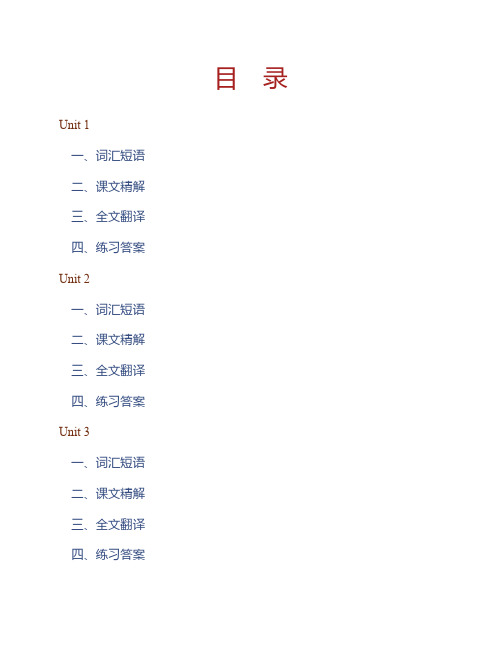
目 录Unit 1一、词汇短语二、课文精解三、全文翻译四、练习答案Unit 2一、词汇短语二、课文精解三、全文翻译四、练习答案Unit 3一、词汇短语二、课文精解三、全文翻译四、练习答案Unit 4一、词汇短语二、课文精解三、全文翻译四、练习答案Unit 5一、词汇短语二、课文精解三、全文翻译四、练习答案Unit 6一、词汇短语二、课文精解三、全文翻译四、练习答案Unit 7一、词汇短语二、课文精解三、全文翻译四、练习答案Unit 8一、词汇短语二、课文精解三、全文翻译四、练习答案Unit 9一、词汇短语二、课文精解三、全文翻译四、练习答案Unit 10一、词汇短语二、课文精解三、全文翻译四、练习答案Unit 1一、词汇短语Part 1. Preparationby its very nature就其本质而言unconditional [5QnkEn5diFEnEl] adj.无条件的,无限制的,绝对的【例句】The victorious army demanded unconditional surrender. 胜方要求敌人无条件投降。
【搭配】unconditional surrender 无条件投降live up to不辜负;做到;实践【例句】In some ways, we failed to live up to one another’s expectations. 在某些方面,我们互相的期望都落了空。
do one’s duty尽职责Part 2. Reading-Centered ActivitiesIn-Class Readingseverely [si5viEli] adv.严格地,激烈地【例句】Those responsible for this crime will be severely punished. 犯下这宗罪行的人将受到严厉惩罚。
severe [si5viE] adj.严厉的,严格的;剧烈的;严重的,严峻的【例句】He’s suffering from severe mental disorder. 他患有严重的精神病。
第三版:综合英语教程第二册第3单元课件r

Conversation
A:Hi, Peter, walking your dog again? B:Rose, her name's Rose! Haven't I told you before? A:Oh, yes. ...Very good. Er ... she looks like a good dog, but the dogs in my neighbourhood are very noisy. I simply can't bear to hear them barking all day long. B: Oh, do they often bark? Um ... I think ... A: You know, Peter, I've always wondered why on earth people like keeping pets. B:Well, I guess, pets ... especially dogs ... they keep you company, don't they? They are like your friends.
B: Me, a pessimist? Are you joking? I love life, not just our own life, but the life of animals, of my pets. Let me tell you the truth, I also keep a dozen of goldfish, a couple of birds, and I'm going to keep a cat soon. A:Oh, really? That should really keep you busy. But, man, have you ever heard of the saying"life is short?" Spending too much on those things certainly won't make the best of your life. B:"Life is short!" What a pessimist you are! Ha,ha,ha ...
新编英语教程第三版第二册unit 3
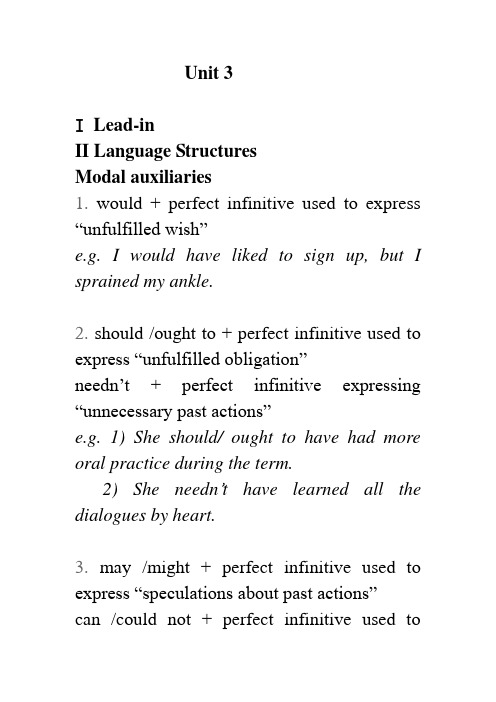
Unit 3I Lead-inII Language StructuresModal auxiliaries1. would + perfect infinitive used to express “unfulfilled wish”e.g. I would have liked to sign up, but I sprained my ankle.2. should /ought to + perfect infinitive used to express “unfulfilled obligation”needn’t + perfect infinitive expressing “unnecessary past actions”e.g. 1) She should/ ought to have had more oral practice during the term.2) She needn’t have learned all the dialogues by heart.3. may /might + perfect infinitive used to express “speculations about past actions”can /could not + perfect infinitive used toexpress “negative deduction about past actions”e.g. 1)He may/might have gone to the library.2) She can’t/couldn’t have gone to the library.4. must + perfect infinitive used to express “affirmative deduction about past actions”may /might as well used with the second person pronoun expressing “suggestions”e.g. 1) She must have gone to the language lab.2) Y ou may/might as well use my bike.Preparatory QuestionsDirections: Recast the following sentences using the following phrases:1. “would have liked to (do)”Notice:would have liked to (do)is used with the first person to express the speaker’s wish that was not fulfilled.1) I intended to go skating with you yesterdaybut I couldn’t because my mother didn’t let me.(Response: I would have liked to go skating with you yesterday, but my mother didn’let me.)2) I meant to sit in on Professor Wang’s class this morning but I didn’t because I had an important meeting to attend.(Response: I would have liked to sit in on Professor Wang’s class this morning, but I had an important meeting to attend.)3) I intended to take part in the basketball match yesterday afternoon but I couldn’t because I had a bad fall yesterday morning. (Response: I would have liked to take part in the basketball match yesterday afternoon, but I had a bad fall yesterday morning.)4) I planned to lend you my cassette recorder, but I didn’t, because it was out of order. (Response: I would have liked to lend you my cassette recorder, but it was out oforder.)2. should/ought to + perfect infinitive Notice:should/ought to + perfect infinitive, indicating a past obligation that was not fulfilled1) The exhibition was a good one. All of us visited it except John.(Response: : John should/ought to have come with us.)2) We all learned a lot from the lecture, but Li didn’t attend it.(Response: : Li ought to/should have attended the lecture.)3) The engineer went to the research institute without an umbrella and was caught in the rain.(Response: : The engineer ought to/should have taken an umbrella with him.)4) They bought a book for Mary but she didn’t like it.(Response: : They oughtn’t to/shouldn’t havebought the book for Mary.)needn’t + perfect infinitiveNotice: needn’t + perfect infinitive, indicating something that was unnecessarily done in the past1) I wrote a summary in more than five hundred words. But the teacher only asked for 200 words.(Response: : I needn’t have written such a long summary.)2) Lin answered all the ten questions in the test paper. But we were only required toanswer eight of them.(Response: : Lin needn’t have answered all the ten questions in the test paper.)3) Mary went to the station an hour before the train started.(Response: : Mary needn’t have gone to the station so early.)4) Yao carried all the parcels home herself. She didn’t know they would deliver them ifshe asked them.)(Response: : Yao needn’t have carried all the parcels home herself. They would have delivered them if she had asked them.)3.may/might +perfect infinitiveNotice: may/might +perfect infinitive, indicating speculations about past actions1) Where is Susan? I want to go to the canteen with her.(Response: : She may/might have gone there already.)2) It’s a fortnight since Sun went to the South and we haven’t got a word from him. I wonder if he’s forgotten us all. (Response: : He may/might have been very busy with his work there.)3) Sid told me he’d let me have the library book after he’d finished with it. It’s a week since he said that and he still hasn’t given me the book.(Response: : He may/might have returned thebook to the library. // He may / might not have finished reading it yet.)4) I’ve been looking for my bicycle key for three days, and it’s still nowhere to be found. (Response: : You may/might have lost it.)can’t/couldn’t + perfect infinitiveNotice: can’t/couldn’t + perfect infinitive, indicating negative deduction about past actionsThe first part of the response can be given to the students as a prompt.1) Where is my typewriter? Someone must have stolen it last night.(Response: : It was here a moment ago. It couldn’t have been stolen last night.)2) Keith ought to be here now. Perhaps he’s lost his way.(Response: : I told him how to come and I even drew him a map. He can’t have lost his way.)3) Who brought the refrigerator upstairs?Perhaps it was Tim.(Response: : Tim’s not that strong. He couldn’t have brought it by himself.)4) A man answered the phone. I suppose it was her husband.(Response: : But her husband hasn’t come back from abroad yet. It couldn’t have been her husband.)4. must + perfect infinitiveNotice: must + perfect infinitive, indicating affirmative deduction about past actions1) The film he saw last night was wonderful. (Response: : He must have enjoyed seeing it.)2) He looks tired, doesn’t he?(Response: : He must have worked hard. / He must have stayed up late last night.)3) The children were making a lot of noise until five minutes ago. Now it is so quiet. (Response: : The children must have gone away.)4) James has checked all the figures twice over,but he can’t get the correct answer. (Response: : James must have made a mistake somewhere.)5. may/might as wellNotice: may/might as well, used with the second person pronoun to express the speaker’ssuggestion(s)1) I am so exhausted after work. (Response: : You may/might as well go to sleep.)2) I’m not feeling well. I think I’ve got a cold. (Response: : Being so weak, you may/might as well see a doctor.)3) It is too hot for Karen and me to go for a picnic.(Response: : Why don’t you change it to another day? You may/might as well go to a movie today.)4) Nick won’t take up the additional work. He just wants to do his part.(Response: : You may/might as well ask Lucy to do it. To get ahead on her job, she iswilling to try new things.)Dialogue Pollution ControlA.Listening to the recordingB.Q uestions on the dialogue1.W hy is London no longer a city full of fog?2.W hat is the cause of air and water pollution in the city where A lives?3.W hat problems do car bring?4.W hat should be done to bring pollution in China completely under control?5.D o you think that environmental pollution in China has been effectively reduced? If so, please cite some facts or examples.C. Language Points1.It must be terrible living there.—Living there must be terrible. The introductory it is a formal subject, whereas the -ing participleliving is the real subject. Another example, e.g. It is great fun boating on the lake.2. the Clean Air Ac t — This was the result of the recommendations made by the Beaver Committee which was set up to inquire into the question of urban pollution in Britain. The committee was so named because its chairman was Sir Hugh Beaver.3. enforce v .give emphasis or strength to sth.加强;make sth.(a law ) obeyed or effective by force强迫服从,实施;force or cause sth. to be done or to happen迫使(某事)发生e.g. 1) Mike must provide enough examples to enforce his argument.2) Y ou have no right to enforce your own views on me.3) The government is unable to enforce its own laws and regulations.4. the Thames/temz/is swarmingwith fish —the River Thames is full of fish that move about busily. The names of rivers are preceded by the definite article the, e.g., the Yangzi River, the Yellow River, the Hudson River, the River Mississippi.e.g. 1)Each summer the swimming pool swarms with people.2) That town is always swarming with tourists from all over the world.5. double: twice as much or as many as usual; 成双的,双重的,两倍的a. n. v.a double bed/room at/on the double 迅速地,立即地;以跑步方式e.g.1) The boss will give him double pay for working overtime.2) The date had a double significance.3) Y ou’d better be double careful when crossing the street.4) The population of Japan doubles that of Canada.5) The child birthrate in that area hasdoubled.6. torment n. extreme suffering, especially mental suffering; a person or thing that causes this.痛苦,折磨 v.e.g. 1) Love is a sweet torment.2) David has never suffered the torment of rejection.3)They never torment themselves or each other over imperfections.7.treatment devices—devices used to treat smoke, dust, and water pollution 治理三废设备e.g. 1) The television receiver is an electronic device.2) Sending advertising by email is very effective marketing device.3) His illness is merely a device to avoid seeing his girlfriend.8. residential a. containing or suitable for private houses; connected with or based on residence住宅的,与居住有关的e.g.1) Gradually the surrounding farmland turned into residential areas.2) It is a nice residential section, equipped with modern conveniences.resident a. 居住的;n.居民,居住者residence n. 居住,住宅reside v.居住,定居9.irritate v. make ab. angry, annoyed or impatient 激怒,使烦躁;cause discomfort to(a part of body)使不舒服,刺激e.g. 1) Our faults irritate us most when we see them in others.2) Her effusive manner of greeting her friends finally began to irritate them.3) These tight shoes irritate my toes.10. more and more people have come to know how harmful... —more and morepeople begin to know how harmful ... The infinitive after the verb come expresses an action that takes place gradually over some time.e.g.After working with Mrs. Brown, who appeared quite hard-hearted, in the same office for many years, I’ve come to see that she has a heart of gold.11. make stricter laws to that effect—make stricter laws with the intention to forbid car horns blowing in the streets. The word effect refers to what B says in the preceding line “it’s against the law to blow car horns in any street in town.”to that effect: used to show that you’re giving the general meaning of what sb. has said or written rather than te exact words表示那个/这个意思,大意如此e.g.1)He said he was greatly worried, or words to that effect.2) Mary said she hated to see John, or hearof the words to that effect.to this/the effect 大意是说to good/great/ dramatic effect 产生好的结果to no effect 无效果,不起作用Expressions in Focus1. “do away with...”—terminate, get rid of; abolish sth. e.g.e.g. 1) Why not do away with all the junk in your room? It is getting more and more untidy!2) How could they do away with a lovely old building like that and put a car park there instead?3) These ridiculous rules and regulations should have been done away with years ago.2. “add to…”— increase or have an increased effect;“add sth. to sth.” —put sth. together with sth. else so as to increase e.g.e.g.1) His words did nothing but added to myanger.2) The bad weather only added to our difficulties.3) Teachers should exercise their imagination and add art to their teaching.3. “bring…under control”—subdue or master sth.e.g.1) To bring the noisy children under control, the teachers told them the story of “Buzzy Bees”.2) Hundreds of firemen have brought a wildfire spread over nine square kilometers of land under control after battling to put out the flames for two days.3) The Prime Minister said yesterday that the government is making all efforts to bring the high inflation under control.D. RetellingSample outline for retellingB, a student from England, is talking to A about the pollution problem.1. B tells A about London at present: the steps that have been taken by the government and the change that has taken place.2. A and B talk about the pollution problem in China:1) air pollution in factory zones;2) noise pollution in city streets;3) A tells B that the Chinese government has taken some measures to control pollution.Reading I Environment PollutionA. Pre-Reading ActivityThe environmental pollution on our planet has caused undesirable change and harmfully affected health, survival and activities of humans and other living organisms. Now, please think about the following questions before you read the text.1.What are the major causes of environmental pollution?Sample: Development of industry and Urbanization.2.Is the place where you live polluted or even seriously polluted? If so, describe to your partner.3. What can we do to reduce environmental pollution?Sample: We should curb the sewage and smoke from factories, perform garbage classification and recycle wastes.B. Background NotesParticle Pollution (PM10) and (PM2.5)1.Particle(n.颗粒,微粒;微量,极小量) pollution(also known as "particulate<n.微粒,颗粒,粒子> matter") in the air includes a mixture of solids and liquid droplets(液体的小滴). Some particles are emitted directly; others are formed in the atmosphere when other pollutants react. Particles come in a widerange of sizes. Those less than 10 micrometers in diameter直径(PM10) are so small that they can get into the lungs, potentially causing serious health problems. Ten micrometers is smaller than the width of a single human hair. Fine particles (PM2.5). Particles less than 2.5 micrometers in diameter are called "fine" particles. These particles are so small they can be detected only with an electron microscope. Sources of fine particles include all types of combustion, including motor vehicles, power plants, residential wood burning, forest fires, agricultural burning, and some industrial processes.Coarse(粗糙的,粗鲁的;粗野的,粗俗的)dust particles. Particles between 2.5 and 10 micrometers in diameter are referred to as "coarse." Sources of coarse particles include crushing or grinding operations, and dust stirred up by vehicles traveling on roads.2. fog and haze雾霾Fog and haze differ in that fog is a thick, opaque(不透明的,晦涩的;难以理解的)effect that lasts a short time, while haze is a thin, translucent (a.半透明的)effect that lasts a long time.FogWhether created by nature or machine, fog consists of liquid droplets suspended(v.使悬浮;悬,挂;停止,终止;延缓,暂缓执行)in the air. Fog machines create fog by vaporizing(v.使蒸化,使汽发;吹牛,吹嘘)fog fluid –that is, they convert the fog fluid from a liquid form to an aerosol(n.悬浮微粒,浮质;烟雾机,气雾剂)form.HazeLike fog, haze consists of liquid droplets, but the drops are very fine and are distributed evenly over a large area to form a mist.C.Questions on P35.nguage Points1.surroundings—the conditions, scenery,etc. around a person, place or thing; environment. The word “surrounding”, however, is generally used as an adjective.e.g. They make regular checks on the surrounding areas for pollution levels.2. The adjective “dirty” and the noun “poison” are used as verbs here, which respectively mean “to make…dirty” and “to put poison in” or “to cause poisoning”.3.pesticide n. chemical substance used to kill pests, esp. insectse.g.1)The biotechnology company is developing a range of new pesticide.2)The insects have become resistant to the pesticide.4.ruin v. n. severe damage or destruction毁灭,破坏;废墟e.g.1) The most glorious city at the time was burned down to be fiery ruins.2) Whom God would ruin, he first deprives of reason.3)One indiscreet remark at the wrong moment could ruin the whole plan.若时机不当,一言不慎,可能毁掉整个计划。
新视野大学英语第三版读写教程第二册Unit3课文及翻译
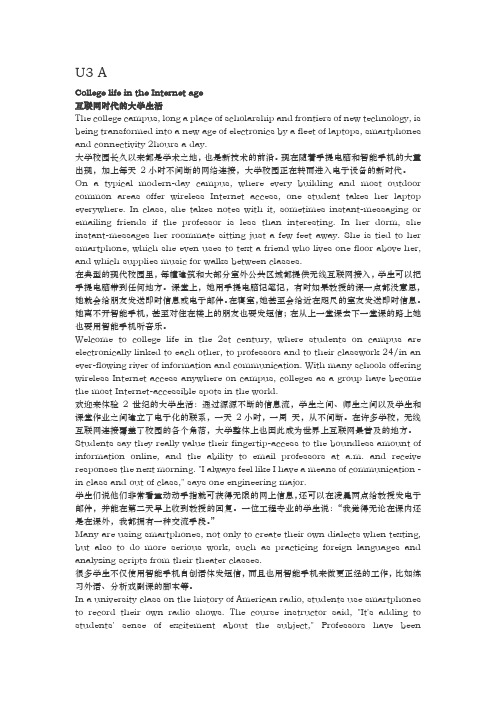
U3 ACollege life in the Internet age互联网时代的大学生活The college campus, long a place of scholarship and frontiers of new technology, is being transformed into a new age of electronics by a fleet of laptops, smartphones and connectivity 2hours a day.大学校园长久以来都是学术之地,也是新技术的前沿。
现在随着手提电脑和智能手机的大量出现,加上每天2小时不间断的网络连接,大学校园正在转而进入电子设备的新时代。
On a typical modern-day campus, where every building and most outdoor common areas offer wireless Internet access, one student takes her laptop everywhere. In class, she takes notes with it, sometimes instant-messaging or emailing friends if the professor is less than interesting. In her dorm, she instant-messages her roommate sitting just a few feet away. She is tied to her smartphone, which she even uses to text a friend who lives one floor above her, and which supplies music for walks between classes.在典型的现代校园里,每幢建筑和大部分室外公共区域都提供无线互联网接入,学生可以把手提电脑带到任何地方。
全新版大学英语第二版第三册词汇
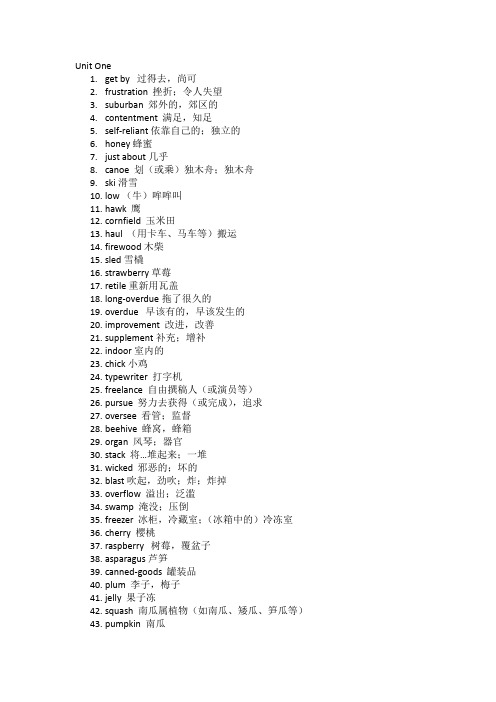
Unit One1.get by 过得去,尚可2.frustration 挫折;令人失望3.suburban 郊外的,郊区的4.contentment 满足,知足5.self-reliant 依靠自己的;独立的6.honey 蜂蜜7.just about 几乎8.canoe 划(或乘)独木舟;独木舟9.ski 滑雪10.low (牛)哞哞叫11.hawk 鹰12.cornfield 玉米田13.haul (用卡车、马车等)搬运14.firewood 木柴15.sled 雪橇16.strawberry 草莓17.retile 重新用瓦盖18.long-overdue拖了很久的19.overdue 早该有的,早该发生的20.improvement 改进,改善21.supplement 补充;增补22.indoor 室内的23.chick 小鸡24.typewriter 打字机25.freelance 自由撰稿人(或演员等)26.pursue 努力去获得(或完成),追求27.oversee 看管;监督28.beehive 蜂窝,蜂箱an 风琴;器官30.stack 将…堆起来;一堆31.wicked 邪恶的;坏的32.blast 吹起,劲吹;炸;炸掉33.overflow 溢出;泛滥34.swamp 淹没;压倒35.freezer 冰柜,冷藏室;(冰箱中的)冷冻室36.cherry 樱桃37.raspberry 树莓,覆盆子38.asparagus 芦笋39.canned-goods 罐装品40.plum 李子,梅子41.jelly 果子冻42.squash 南瓜属植物(如南瓜、矮瓜、笋瓜等)43.pumpkin 南瓜44.get through 通过,度过45.gallon 加仑(液量单位)46.at that point 就在那时47.decidedly 肯定地,无疑地48.employer 雇佣者;雇主49.blessing 祝福;鼓励50.bless 为…祝福51.on balance 总的来说52.den 兽穴53.illustrate 加插图于;举例说明54.hitch 用挽具套住55.dogsled 狗拉雪橇56.monster 怪物;妖怪57.digest 文摘;摘要;消化;融会贯通58.boundary 边界;分界线59.wilderness 荒野;荒地60.wilderness area (保持自然生态的)公共荒野保护区61.generate 形成,产生62.dental 牙的,和牙有关的63.insurance 保险;保险费64.policy 保险单,保险契约;政策65.fee 费66.minor 较少的,较小的,较次要的67.premium 保险费;奖金,奖品68.aside from 除了;除…以外(尚有)69.cut back 减少,削减70.appreciably 能够感到地,可观的71.lower 降低72.dine out 外出吃饭73.patronize 光顾,惠顾74.opera 歌剧75.ballet 芭蕾舞(剧)76.extravagant奢侈的,浪费的bine (使)结合;(使)联合78.suspect 怀疑;相信79.solitude 孤独,独居80.budget 预算81.involve 使参加;使陷入;包含,牵涉82.requirement要求;必要条件83.self-sufficiency 自给自足84.scale 规模85.on a small / large scale 小(大)规模地86.resist 抵制87.temptation 诱惑(物)borsaving 省力的;节省劳力的89.device 设备,装置90.machinery 机器,机械91.horsepower 马力92.rotary 旋转的93.cultivator 耕耘机94.rotary cultivator 旋转式耕耘机95.profit 得益;收益,利润;获利,得益;有益于96.invest 投资97.economic 经济学的;经济(方面)的98.old-fashioned 过时的,老式的;守旧的Unit Two1.Canadian 加拿大的;加拿大人的;加拿大人2.alongside 在旁边;沿着边;在…旁边;沿着…的边3.slender 苗条的;细长的4.settlement 新拓居地5.confident 有信心的;确信的6.creator 造物主,上帝7.devotion 深爱,挚爱8.cabin 小棚屋,小木屋9.ironically 具有讽刺意味的是10.symbolize 象征,标志11.racial 种族的12.sellout 背叛者;出卖者;背叛;出卖13.unwilling 不愿意的;勉强的14.stand up (for) 支持15.historic 有历史意义的16.site 地方,位置,遗址17.slavery 受奴役的状态;奴隶制18.mission 特殊使命,任务19.courageous 勇敢的,无畏的20.forge (靠艰苦工作)建立21.web 网状物;网状组织22.authorize 批准,委托23.civil-rights 民权的24.civil 公民的25.unsung (在诗或歌中)未赞颂过的;未获得承认的26.intent 热中的;坚决的27.be intent on(sth. / doing sth) 热衷于,坚决要做28.peer 仔细看,费力的看,凝视29.urgent 紧迫的;急迫的30.pistol 手枪31.decade 十年(期)32.someday 将来某一天;总有一天33.on the side 作为兼职;秘密地34.foundry 铸造车间;铸造厂35.hunter 狩猎者;猎人36.capture 抓捕,捕获37.chilly 寒飕飕的,冷的38.fugitive 逃亡者39.watchman 看守人;警卫员40.spot 看出;辨认;发现41.helplessly 无能为力地42.pursuer 追赶者;追捕者43.close in (on / around) 接近;包围44.hurriedly 仓促地;匆忙地45.wagon 四轮运货马车(或牛车)46.leg 一段行程47.motivate 使产生动机,激起48.religious 宗教的,宗教上的49.conviction 坚定的看法或信仰50.Quaker (基督教)贵格会教徒,公谊会教徒51.Bible (基督教)《圣经》52.bid 吩咐;告诉53.clothe 供给…衣服;给…穿衣服54.naked 裸体的,赤条条的55.refuge 避难(所);庇护(所)56.shelter 给…提供庇护处;保护;遮蔽;庇护;遮蔽物;庇护物57.converge 会合;集中58.terminal (铁路、公共汽车等的)终点;(计算机系统的)终端机59.threat 恐吓;威胁60.magistrate 地方行政长官;执法官61.impose 把…强加于62.jail 监狱63.Methodist 循道宗(信徒)的64.imprison 关押,监禁;束缚65.log 观察记录66.stripe 鞭打;抽打67.as for 至于68.cake 覆盖69.bonnet (有带)女帽70.veil 面纱;面罩71.runaway 逃跑的(人)72.disguise 假扮,伪装73.procession 行列,队伍74.abolish 废除(法律、习俗等)75.virgin 未开发的;处女76.harshly 严厉地,苛刻的77.make the best of 尽量利用,充分利用78.diligently 勤奋地pel 强迫;强求80.plantation 种植园81.salvation 拯救,解救82.at risk 有危险;冒风险83.in the eyes of 在(某人)看来84.pass for 被看作;被当作85.colonel (美国陆、空军及海军陆战队的)上校Unit Threetch 门闩2.on the latch (门)关着但没有上锁3.universal 全体的;共同的;普遍的4.close up (尤指暂时)关闭5.rural 农村的;有乡村特点的6.unlock 开(门等的)锁7.suburb 郊区8.vulnerable 易受攻击的;无防御的9.well-patroled 巡查严密的10.patrol 巡逻;巡查11.urban 城市的,都市的12.statistics 统计;统计资料13.dramatically 显著地;戏剧性地14.allegedly 据称15.allege 宣称,声称16.tranquil 宁静的;平静的17.era 纪元;年代;时代18.dead-bolt (钢栓式)防盗门19.bolt (门、窗等的)闩20.electronic 电子的21.trip wire 触发式警报装置;(陷阱的)绊索22.system 系统;体系,体制;制度23.hook up to 连接到24.patio 露台,平台25.elegantly 优雅地,高雅地26.build in 使成为建筑物的一部分27.pry 撬开,撬动28.paste 用浆糊粘贴;浆糊;糊状物29.premise (包括地基在内的)房屋30.surveillance 监视31.feature 给…以显著地位,突出;由…主演32.chart 图表,示意图33.padlock 挂锁;扣锁34.ad 广告35.atmosphere 气氛;(包围地球的)大气36.psychic 精神的;心灵的;心理的37.transformation 改变,转变38.put up 建造,设置39.barrier 障碍;妨碍40.barricade 在…设置路障;路障,街垒41.medium 中等的;平均的42.wander 漫游;闲逛;徘徊43.threaten 威胁;恐吓;扬言要44.outsider 外人;局外人45.sophisticated 复杂的,精致的;世故的,老练的46.X-ray (使用)X射线的47.terrorist 恐怖主义的;恐怖分子48.terror 恐怖;恐怖的事49.frisker 搜身器;搜查器50.without / with not so much as 甚至连…都没…51.sideways 斜着(的);斜向一边(的)52.stand for 代表;表示,象征53.be bathed in 沉浸于,沐浴于54.analyze 分析;解析;研究55.with / by a small / large margin 小/大幅度地56.caller 打电话者;来访者57.error 错误;差错;误差58.client (律师、会计师等的)委托人;顾客59.insecure 不安全的,不可靠的60.civilize 开化,使文明61.reflection 有损声誉(或受指责)的事;思考;反映62.rape 强奸(罪);强奸63.whistle 哨子64.self-protection 自我保护;自我防卫65.outsmart 比…精明;智胜66.outsmart oneself 聪明反被聪明误67.legacy 遗产;传留下来的东西68.look back on 回顾69.unseen 未被看到的;看不见的Unit Four1.in a row 连续地2.doze off 打瞌睡,打盹儿3.briskly 轻快地4.patent 专利5.frail 虚弱的6.approve 赞成;同意;批准7.strain 使紧张;拉紧,绷紧8.mess 脏乱状态9.revolutionize 彻底改变10.atom 原子11.molecule 分子12.photon 光子13.foundation 基础;基本原理14.quantum 量子15.relativity 相对论16.fabric 织物,织品17.outburst (感情等的)爆发18.seclude 使隔离19.outbreak (疾病等的)爆发20.plague 瘟疫21.gravitation 引力22.historian 历史学家23.anniversary 周年纪念日24.bushy-haired 头发浓密的25.superthinker 超级思想家26.physicist 物理学家27.unravel 解决,阐明28.remarkable 值得注意的;非凡的29.author 著(书),写作30.irreverent 不尊敬的e to / reach a conclusion 得出结论32.photoelectric 光电(效应)的33.zinc 锌34.electron 电子35.loose 松的;不受束缚的,自由的36.spread-out 展开的;散开的37.particulate 粒子(的),微粒(的)38.blackbody 黑体39.radiation 辐射40.particle 粒子,质点41.unify 使成一体;使结合42.magnetism 磁性;磁力43.optics 光学44.beyond (any) doubt 毫无疑问45.electromagnetic 电磁(体)的46.not give / care a fig (for sb. / sth.) 对…毫不在乎47.presence 出席,到场48.undermine 暗中破坏;逐渐损害49.(never) get anywhere / get nowhere 一事无成50.flaw 缺陷51.Ph. D. Doctor of Philosophy 哲学博士52.beholden 受惠的;铭感的53.thesis 论文54.advisor 顾问;指导教师55.roam 漫游56.accordingly 因此;从而;相应的arre 稀奇古怪的58.duality 两重性;二元性59.baffle 使困惑,难住60.disdain 轻视;蔑视61.caution 小心,谨慎62.intuitive 直觉的63.believe in 认为(某事)是正确的或合适的;对…有信心64.intuition 直觉65.inspiration 灵感66.dynamo 发电机67.arc 弧光68.bulb 灯泡69.high-tech 高科技的70.at the turn of the century 在世纪初71.silicon 硅72.babysitter 代人临时照看小孩的人73.couch 长沙发74.impressive 给人以深刻印象75.concentration 集中;专心76.precariously 不稳的;易倒塌的77.inkwell 墨水池78.backrest 靠背79.engross 使全神贯注80.stimulate 使兴奋;刺激81.outlandishly 奇特的82.passionately 热情的83.assessment 评价84.reality 现实85.grotesque 荒唐的86.credit 把…归于87.imagination 想象力88.orthodox 正统的;传统的89.mightily 强有力地90.gravity 重力,引力91.brainpower 智力,智能92.crinkly 起皱的;波状的93.if anything 要说有什么区别的话;甚至正相反94.trifle 少量;少许95.a trifle 有点儿,稍微Unit Five1.coastguardsman 海岸警卫队队员2.under way 航行中;工作中,进行中3.carton 硬纸盒,纸板箱4.pad 用软的材料衬垫5.rack 炮弹架;架6.ashore 在岸上;向岸边7.traditional 传统的,惯例的8.turkey 火鸡9.put away把…收起,放好10.sundown 日落时分11.afterdeck 后甲板12.draught 气流;一次吸入(或饮入)的量13.get to sth. / doing sth. 开始认真思考(或做)14.cob 玉米穗轴15.and the rest 等等16.quest 寻求,追求17.in quest of 寻求,探求18.reverse 反转;交换…的位置19.verbal文字的;口头的;动词的,跟动词有关的20.turn over 考虑;思考21.brighten (使)变亮,(使)变得更亮22.repay 偿还,报答23.take…for granted 认为…是理所当然24.sincere 诚挚的,真诚的stingly 长久地26.gratitude 感激,谢意27.statement 陈述;声明28.heartfelt 衷心的,由衷的29.appreciation 感谢;欣赏30.agricultural 农业的,农艺的31.Rev. = Reverend (对牧师的尊称)尊敬的32.at sea 在海上航行33.specific 明确的;具体的34.behalf 利益,好处35.on sb.'s behalf / on the behalf of sb. 为(某人),为了(某人)的利益;代表(某人)36.instance 实例,例子37.uppermost 最高的,突出的38.boyhood 少年时代39.diminish (使)变小;(使)减少40.expose 使暴露,使接触41.be exposed to 暴露于;与…接触42.immerse 使浸没;使沉迷43.be immersed in 沉浸在;沉迷于44.marvelous 不可思议的;美妙的45.prayer 祈祷,祷告46.assemble 集合;装配47.in part 在某种程度上;部分地48.considerate 体贴的;考虑周到的49.sprinkle 将…洒在…上;洒50.stardust 梦幻51.sack 麻袋;大袋52.unload 卸(货);将货从(车、船等)上卸下53.cargo (车、船、飞机等所载的)货物54.reload 再装55.recede 变得模糊;退去56. rendezvous (在预期的时间和地点)会合;约会,会面57.accord 使符合;给予58.topmost 最高的,顶端的59.loudspeaker 扩音器,喇叭60.rasp 发出(刺耳的声音);锉,刮61.hundred-odd 一百多个62.odd 稍多于;单数的;奇怪的63.shipmate 同船水手64.deck 甲板65.cluster 群集;群;簇,丛66.seaman 海员,水手,水兵67.bulge (使)鼓胀68.fistful 一把69.successive接连不断的,连续的70.in turn 挨个地,轮流地71.amid 在…当中,在…之间72.sake 目的;理由;利益73.for Pete’s, God’s, ect. sake 看在上帝份上,天哪,哎呀74.sentimental 情感(上)的;情绪化的,感伤的75.undergo 经过;经历76.swift 迅疾的,即时的77.reassurance 放心,确信78.bring back 回想起79.in a flash 一瞬间80.weep 流(泪),(为…而)哭泣81.gratefulness 感激;感谢82.diaper 尿布;给…衬尿布83.being 生命;人84.go about 表现;忙于;着手85.long for (sth.) / to (do sth.) 渴望86.in secret 秘密地,暗自87.quote 引用,引述88.paramount 最主要的,最重要的89.stationery 信纸信封;文具Unit Six1.studio 画室;照相室;工作室2.chicory 菊苣3.bishop 主教4.sleeve 衣袖5.bishop sleeve 灯笼袖6.in tune 和谐的(地)7.joint 共同的;共有的8.pneumonia 肺炎9.stalk 可怕地蔓延或游荡(于);潜行;偷偷接近10.icy 极冷的;冰冷的11.scarcely 几乎没有;几乎不12.scarce 不充足的;难得的13.hallway 门厅;过道14.bushy 密生的;丛生的15.eyebrow 眉毛16.bosh 胡说;无意义的话17.carriage (四轮)载人的马车18.subtract 减去;扣除19.curative 能治病的20.whistle 用口哨吹出(曲调等);吹口哨21.merry 高兴的;愉快的;欢乐的22.bedclothes 床上用品23.backward 倒着24.dreary 沉闷的;阴沉的;使人忧郁的25.ivy 常春藤26.vine 藤,藤本植物;攀缘植物27.in a whisper 低声地28.hear of 听说,得知29.nonsense 废话;荒唐念头;愚蠢的行为30.turn loose 放手;放纵31.miner 矿工32.look the part 看上去很像33.masterpiece (尤指艺术品)杰作;代表作34.gin 杜松子酒35.to excess 过度36.for the rest 至于其它37.mock 嘲弄;取笑38.softness 软弱;意志不坚定39.dimly 暗淡地,模糊不清地40.canvas (油画)画布41.easel 画架42.fancy 幻想;幻觉;胡思乱想43.fragile 易碎的;虚弱的44.persistent 持续的;一再发生的45.mingle 混合46.upturned 翻转的;倒着放的47.pull up 拉起48.wearily 疲倦地;劳累地49.lo 看,瞧50.endure 持续;忍受,忍耐51.stand out 显著;突出52.wear away (时间)流逝;磨损,磨去53.twilight 暮色;黄昏54.lone 孤独的;孤单的55.cling 抓紧;抱紧56.cling to 紧紧抓住(或抱住)57.merciless 无慈悲心的;无怜悯心的58.call to 呼唤59.stove 炉;火炉;暖炉60.sin 罪孽;罪过61.hand-mirror 带手柄的小镜子62.sit up 坐起来63.acute 急性的;严重的64.be wet through 湿透的ntern 灯笼66.palette 调色板67.flutter 飘动,晃动。
全新版大学英语综合教程第二版第三册课后习题答案-第三单元
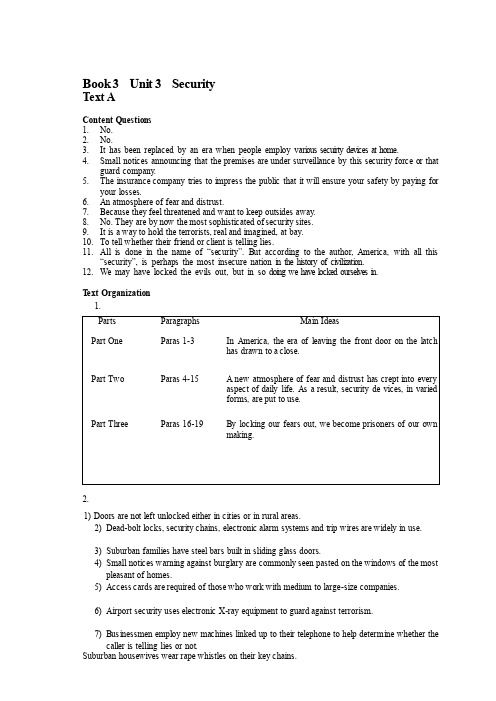
Book 3 Unit 3 SecurityText AContent Questions1.No.2.No.3.It has been replaced by an era when people employ vari ous secui rty devi ces at home.4.Small notices announcing that the premises are under surveillance by this security force or thatguard company.5.The insurance company tries to impress the public that it will ensure your safety by paying foryour losses.6.An atmosphere of fear and distrust.7.Because they feel threatened and want to keep outsides away.8.No. They are by now the most sophisticated of security sites.9.It is a way to hold the terrorists, real and imagined, at bay.10.To tell whether their friend or client is telling lies.11.All is done in the nam e of “security”. But according to the author, America, with all this“security”, is perhaps the most insecure nation i n the hi story of ci vili zati on.12.We may have locked the evils out, but in so doi ng we have l ocked oursel ves i n.T ext Organization1.2.1) Doors are not left unlocked either in cities or in rural areas.2)Dead-bolt locks, security chains, electronic alarm systems and trip wires are widely in use.3)Suburban families have steel bars built in sliding glass doors.4)Small notices warning against burglary are commonly seen pasted on the windows of the mostpleasant of homes.5)Access cards are required of those who work with medium to large-size companies.6)Airport security uses electronic X-ray equipment to guard against terrorism.7)Businessmen employ new machines linked up to their telephone to help determine whether thecaller is telling lies or not.Suburban housewives wear rape whistles on their key chains.Language Sense EnhancementI. 1) electronic 2) hooked up to3) suburban 4) built in5) uncommon 6) announcing7) survaillance 8) symbol9) featured 10) attached toLanguage FocusVocabulary1.2) by a small margin4) closed up6) paste8) sideways 10) universal12) Bathed in2) looked back on4) fit into 6) lies in 8) stand for3. 1) A certain gene which is likely to make people vulnerable to asthma has been found byresearchers at the Department of Clinical Medicine in Oxford.2) A wardrobe with mirrored doors had to be built in so as to make their small bedroom look larger.3) The NBC show's opening shots feature the space shuttle Challenger blowing up in January 1986—killing all seven crew.4) When the teacher threatened to keep the pupils in after school they were qui eted at once.5) Energy difficulties are a major barrier to the country's economic growth due to the fact that imported oil has absorbed 40% of its foreign exchange / because imported oil has absorbed 40% of its foreign exchange.4. 1) Jacob looked back on his summer holidays spent on the B i g Isl and of H awaii wi th i tsbeautiful landscape and tranquil atmosphere as a rare escape from the madness of urban l i fe.2) Learning in the information era is really convenient and efficient. With your computer hooked up to the internet, you can easily obtain the electronic resources relevant to your research.3) Detectives, who believe more than one person is behind the constant attacks in the suburb, are using a sophisticated computer system to analyze specific behavior and situations. However, they are also aware that they shouldn ’t rely too much on computer because it may make errors at times..I. 1. 1) threathens3) civilize5) wandered7) without so much as9) hook up to11) chartII. Collocation1. away2. inside/in3. forward/through4. back5. off6. home7. back, down 8. in, outIII. Usage1.Internet is not such an unusual word as it used to be.2.Most men do not look unattractive in them.3.Wealthy as she is, she is not unconcerned by her sudden unemployment.4.This claim is not unrealistic in view of a sharp decrease in the city's violent crimes.5.His poor health is not unrelated to his unhealthy way of life.Comprehensive ExercisesI. Cloze1.1. Statistics2. rural3. era4. stood for5. on the latch6. vulnerable7. barriers 8. electronic9. reflection 10.civilized2.1. tougher2. liable3. shift4. electric5. cautious6. sophisticated7. thieves 8. break9. chances 10. signsII. T ranslation1.1).The Internet is changing the way people l i ve, no matter whether they are i n urb an or rural areas.2).Medium-sized and small companies are more vulnerable to the threat of the global economic crisi s than largeones.3).With regard to our term papers, the professor asked us to analyze the chart of unemployment first, and thenprovide criti cal reflections on the nation’s economic development.4).It never occurred to him that thei r team woul d wi n the basketbal l match b y a large margin.5).Looking back on my twenty years’ teaching in high school, I attributed my success to patience, talent, and theconstant pursuit of knowledge.2.It is almost impossible to keep a determined burglar out. All you can do is discourage him for a few minutes, thus exposing him to police patrols or those wandering around. Common sense tells us that lighting is a barrier to criminal activity. A light should be fixed in the doorway and switched on at night. Make sure/assure yourself that you don’t leave the door on the latch if you happen to be the last to come in. If you decide to buy a sophiticated electronic alarm system, be sure to ask for its signs and put them up on both windows and doors. In addition you may have it hooked up to a police station.Chinese T ranslations of T exts A&B第三单元安全问题课文A许多年前,在美国,家家户户白天黑夜不锁门是司空见惯的。
综合英语教程(第三版)BOOK2-课文译文 03.第三单元

第三单元TEXT理解你的主人我认为大多数人类的智商高,记忆力好,解决问题的能力强,尽管我知道你们大多数人的看法恰恰相反。
他们活得比我们长因此更了解过去和未来。
他们把各种声音按不同的顺序排列,就产生了不同的含义,然后他们用此声音进行交流。
这些声音各个地区不同,如果他们生长在不同的国家,又没有受过专门的训练的话,他们的交流就会因此出现障碍。
人类还发明了一系列符号把那一串串的声音表达在纸上。
你经常可以看到他们在专心阅读那些纸上的符号。
运用这两种方法,他们使自己的眼睛和耳朵发展到了一个超出我们狗能够理解的水平。
但这样一来,他们却又失去了我们常用眼、耳以及其他感官获得大量信息的能力。
大多数狗至少能理解人类的一部分词汇(声音意义),而且,我们有的已经学会辨认一些他们写在纸上供不同时代和不同地区的人理解的符号模式。
但是如果这种技能过于发展,我们就会有丧失其他能力的危险。
好在人类理解狗的叫声和行为方式的程度与我们也相差无几。
试着走近一个人,坐在他面前,伸出前爪摆个姿势。
他几乎肯定会抓住前爪握一握,因为这也是人类打招呼的动作。
他会认为你举止像人——没有什么比这更让他高兴的了。
注意,这就有危险了!你不是人。
你是一只狗——如果你要快乐,就千万别忘了这一点。
你得像狗一样生活。
你稍稍改变一下自己去适应人类固然很好,但如果你否认自己的本性,你将变成一条疯狗,而且,人类会认为你是一条坏狗。
动物总有理由选择与另一类动物生活在一起,但是通常我们根本就没有选择。
我们被迫与人类一起生活,加入那个强加于我们的群体,无能为力。
人类很清楚他们需要我们与他们生活在一起,但其实他们并不见得明白个中的道理。
也许他们需要一条狗帮他们狩猎或引路;也许他们需要你们像看门狗那样赶走盗贼;也许他们照顾你们是为了让他们的孩子有责任感;也许他们是想通过饲养你这条名贵而时尚的狗去吸引同类的眼球;又或许他们只是特别需要找个伴儿,或自己喜爱的东西。
(吕睿中译,胡一宁审校)READ MORE一只追踪犬“开始!”我的主人下令道。
新编实用英语综合教程2(第三版)Unit-3

1) Any Message, Sir?
Gao: Hello, ABC Company. May I help you?
George: Hello. This is George Richter. May I speak to Mr. Zhang Lihua?
Gao: I’m sorry, but he’s not in at the moment.
1 Work in pairs. Look at the picture and recite the following mini-talks for communication by phone. 1) Who is speaking, please? Leena: Is it 223-5467? John: Yes. Who is speaking please? Leena: This is Leena Krieg. May I speak to Bill Morgan? John: Oh, I’m sorry. He’s not in at the moment.
on Thursday and asking him to call me any time before lunch. My
phone number is 368-1130.
Gao: I’ve got it.
George: Thank you very much. Gao: You are welcome.
Putting Language to Use
Speak and Complete Speak and Translate Speak and Communicate
SECTION I Talking Face to Face
李荫华《全新版大学英语综合教程(3)》(第2版)学习指南【词汇短语+课文精解+全文翻译+练习答案】

李荫华《全新版大学英语综合教程(3)》(第2版)学习指南【词汇短语+课文精解+全文翻译+练习答案】目录Unit 1 一、词汇短语 二、课文精解 三、全文翻译 四、练习答案Unit 2 一、词汇短语 二、课文精解 三、全文翻译 四、练习答案Unit 3 一、词汇短语 二、课文精解 三、全文翻译 四、练习答案Unit 4 一、词汇短语 二、课文精解 三、全文翻译 四、练习答案Unit 5 一、词汇短语 二、课文精解 三、全文翻译 四、练习答案Unit 6 一、词汇短语 二、课文精解 三、全文翻译 四、练习答案Unit 7 一、词汇短语 二、课文精解 三、全文翻译 四、练习答案Unit 8 一、词汇短语 二、课文精解 三、全文翻译 四、练习答案弘博学习网————各类考试资料全收录内容简介本书是《全新版大学英语综合教程(3)》(第2版)的配套辅导用书,按照原教材的课次进行编写,每单元涉及词汇短语、课文精解、全文翻译以及练习答案内容。
词汇短语中精选每单元的重、难点词汇,每个词后除了释义,还给出了相应的例句,及一些常用的搭配、词组、助记方法等。
课文精解从文中选出重点句子及难以理解的句子加以讲解,其中包括对句子结构分析、相关知识点讲解和延伸。
全文翻译是在参阅了大量与教材相关用书的基础上总结编写而成的。
练习答案提供每单元习题的参考答案。
本书旨在帮助学生更好、更高效地学习和掌握教程中的重点及难点知识,具有很强的针对性和实用性。
在编写过程中,该书力求突出重点,答疑难点,语言言简意赅,讲解深入浅出,希望它能得到广大英语学习者的喜爱和认可。
弘博学习网————各类考试资料全收录Unit 1一、词汇短语Text Aget by通过;过得去;过活;获得认可【例句】No one is able to get by without oxygen. 没有氧气人不能维持生命。
frustration [frQs5treiFEn] n. 挫败;挫折;受挫【例句】He ground his teeth (together) in frustration. 他因失败而把牙咬得咯咯响。
英语综合教程第二册Unit 3 Money and Happiness

1
Quotation
Happiness lies not in the mere possession of money; it lies in the joy of achievement, in the thrill of creative effort. —Franklin Roosevelt Human felicity is produced not so much by great pieces of good fortune that seldom happen, as by little advantages that occur every day. —Benjamin Franklin Most folks are about as happy as they make up their minds to be. — Abraham Lincoln
13
• chart (n.): a form designed to display information about sth. The chart shows clearly that smoking prevalence is closely linked to lung cancer mortality.
• Note:副词more 和than 连在一起使用,修饰形容词、 分词、或动词,表示被修饰的词所表达的强度不够,而 进一步加以说明,意思是“不止”、“非常”。
e.g. 1) To be honest with you, he is more than selfish. He is pompous(高傲自大的) and arrogant. 2) They were more than surprised at what he had done. As a matter of fact, they were astonished.
Unit3词汇总结 (2)新编英语教程第二册 第三单元短语

Unit3词汇总结1.make fun of 取笑p252.physical handicap 身体缺陷p253.turn…… down p264.look down on 看不起p265.I don't get it 我不明白p27line46.It turns out to be 结果是……p27line57.no order 难怪…p27line68.If the worst comes to the worst9.During the rush hour 在上下班时间p27line910.with no mannersp27line1111.turn into charging mob变成情绪激动的暴民p27line1512.elbow one's way to 用胳膊挤着p27line1813.lose one's balance 失去平衡p27line1914.It's shocking to see sth 看到某事很震惊p27line2215.as a rule p27line2216.the seat reserved for the old and weak老人残疾人专座p27line2417.be occupied byp27line2718.ignore one's presence 忽视某人的存在p27line2719.spitting and littering 吐痰乱扔垃圾p27line3120.pass down from generation to generation 一代代流传p27line3721.show sb around 带某人参观p31line222.be sensible to do sth 做…是明智的,理智的p31line223.be accused of 被指责p31line924.accuse sb of sth 控告某人某事(补充)25.demand to do 决定做某事p31line926.march sb through=push sb into p31line1027.be enough to do 足够做某事p31line1128.meet with +adj/n对……作出某种反应p31line10eg:but this was met with silence as they marched me through a side entrance to the store and to a small room upstairs .29.get away with=escapep31line1230.exchange A for B把A换Bp31line331.at the counterp31line432.had better do 最好做某事p31line733.refuse to do 拒绝做某事p31line934.explain to sb 向某人解释p31line1535.continue to do 继续做某事p31line1636.with great reluctance 极不情愿p31line1837.dread to do 不敢想p31line23eg.I dread to think what would happened if Ihad had a less clear –cut case or had been in a more fragile state.fort sb 使某人舒服p31line2239.a less clear–cut case :a case not so easy to makeclear.p31line2340.dash into=rush intop31line241.dash against 撞击,使撞击(补充)42.dash off 匆忙写好(补充)43.It's said that 据说拍p25line444.participate in 参加p33line245.daily subsistence 日常用品p33line346.It occurs to me 有……想法(补充)47.had not occurred to sb =had not idea top33line448.be temped into doing sth 被诱惑做某事(补充)。
新视野大学英语第三版读写教程第二册Unit 3 Door closer, are you?(课文+词汇)
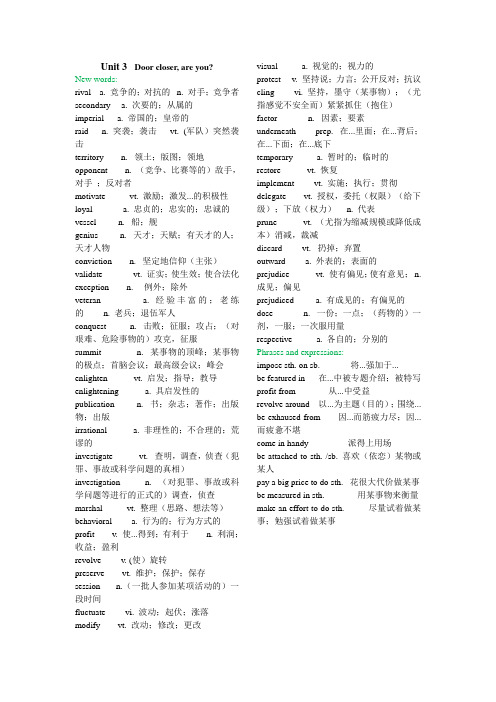
Unit 3 Door closer, are you?New words:rival a. 竞争的;对抗的 n. 对手;竞争者secondary a. 次要的;从属的imperial a. 帝国的;皇帝的raid n. 突袭;袭击 vt. (军队)突然袭击territory n. 领土;版图;领地opponent n. (竞争、比赛等的)敌手,对手;反对者motivate vt. 激励;激发...的积极性loyal a. 忠贞的;忠实的;忠诚的vessel n. 船;舰genius n. 天才;天赋;有天才的人;天才人物conviction n. 坚定地信仰(主张)validate vt. 证实;使生效;使合法化exception n. 例外;除外veteran a. 经验丰富的;老练的 n. 老兵;退伍军人conquest n. 击败;征服;攻占;(对艰难、危险事物的)攻克,征服summit n. 某事物的顶峰;某事物的极点;首脑会议;最高级会议;峰会enlighten vt. 启发;指导;教导enlightening a. 具启发性的publication n. 书;杂志;著作;出版物;出版irrational a. 非理性的;不合理的;荒谬的investigate vt. 查明,调查,侦查(犯罪、事故或科学问题的真相)investigation n. (对犯罪、事故或科学问题等进行的正式的)调查,侦查marshal vt. 整理(思路、想法等)behavioral a. 行为的;行为方式的profit v. 使...得到;有利于n. 利润;收益;盈利revolve v. (使)旋转preserve vt. 维护;保护;保存session n.(一批人参加某项活动的)一段时间fluctuate vi. 波动;起伏;涨落modify vt. 改动;修改;更改visual a. 视觉的;视力的protest v. 坚持说;力言;公开反对;抗议cling vi. 坚持,墨守(某事物);(尤指感觉不安全而)紧紧抓住(抱住)factor n. 因素;要素underneath prep. 在...里面;在...背后;在...下面;在...底下temporary a. 暂时的;临时的restore vt. 恢复implement vt. 实施;执行;贯彻delegate vt. 授权,委托(权限)(给下级);下放(权力)n. 代表prune vt. (尤指为缩减规模或降低成本)消减,裁减discard vt. 扔掉;弃置outward a. 外表的;表面的prejudice vt. 使有偏见;使有意见;n. 成见;偏见prejudiced a. 有成见的;有偏见的dose n. 一份;一点;(药物的)一剂,一服;一次服用量respective a. 各自的;分别的Phrases and expressions:impose sth. on sb. 将...强加于...be featured in 在...中被专题介绍;被特写profit from 从...中受益revolve around 以...为主题(目的);围绕... be exhaused from 因...而筋疲力尽;因...而疲惫不堪come in handy 派得上用场be attached to sth. /sb. 喜欢(依恋)某物或某人pay a big price to do sth. 花很大代价做某事be measured in sth. 用某事物来衡量make an effort to do sth. 尽量试着做某事;勉强试着做某事Door closer, are you?1 The next time you're deciding between rival options, one which is primary and the other which is secondary, ask yourself this question: What would Xiang Yu do?2 Xiang Yu was a Chinese imperial general in the third century BC who took his troops across the Zhang River on a raid into enemy territory. To his troops' astonishment, he ordered their cooking pots crushed and their sailing ships burned.3 He explained that he was imposing on them a necessity for attaining victory over their opponents. What he said was surely motivating, but it wasn't really appreciated by many of his loyal soldiers as they watched their vessels go up in flames. But the genius of General Xiang Yu's conviction would be validated both on the battlefield and in modern social science research. General Xiang Yu was a rare exception to the norm, a veteran leader who was highly respected for his many conquests and who achieved the summit of success.4 He is featured in Dan Ariely's enlightening new publication, Predictably Irrational,a fascinating investigation of seemingly irrational human behavior, such as the tendency for keeping multiple options open. Most people can't marshal the will for painful choices, not even students at the Massachusetts Institute of Technology (MIT), where Dr. Ariely teaches behavioral economics. In an experiment that investigated decision-making, hundreds of students couldn't bear to let their options vanish, even though it was clear they would profit from doing so.5 The experiment revolved around a game that eliminated the excuses we usually have for refusing to let go. In the real world, we can always say, "It's good to preserve our options." Want a good example? A teenager is exhausted from soccer, ballet, piano, and Chinese lessons, but her parents won't stop any one of them because they might come in handy some day!6 In the experiment sessions, students played a computer game that provided cash behind three doors appearing on the screen. The rule was the more money you earned, the better player you were, given a total of 100 clicks. Every time the students opened a door by clicking on it, they would use up one click but wouldn't get any money. However, each subsequent click on that door would earn a fluctuating sum of money, with one door always revealing more money than the others. The important part of the rule was each door switch, though having no cash value, would also use up one of the 100 clicks. Therefore, the winning strategy was to quickly check all the doors and keep clicking on the one with the seemingly highest rewards.7 While playing the game, students noticed a modified visual element: Any door left unclicked for a short while would shrink in size and vanish. Since they already understood the game, they should have ignored the vanishing doors. Nevertheless, they hurried to click on the lesser doors before they vanished, trying to keep them open. As a result, they wasted so many clicks rushing back to the vanishing doors that they lost money in the end. Why were the students so attached to the lesser doors? They would probably protest that they were clinging to the doors to keep future options open, but, according to Dr. Ariely, that isn't the true factor.8 Instead of the excuse to maintain future options open, underneath it all the students' desire was to avoid the immediate, though temporary, pain of watching options close."Closing a door on an option is experienced as a loss, and people are willing to pay a big price to avoid the emotion of loss," Dr. Ariely says. In the experiment, the price was easily measured in lost cash. In life, the corresponding costs are often less obvious such as wasted time or missed opportunities.9 "Sometimes these doors are closing too slowly for us to see them vanishing," Dr. Ariely writes. "We may work more hours at our jobs without realizing that the childhood of our sons and daughters is slipping away."10 So, what can be done to restore balance in our lives? One answer, Dr. Ariely says, is to implement more prohibitions on overbooking. We can work to reduce options on our own, delegating tasks to others and even giving away ideas for others to pursue. He points to marriage as an example, "In marriage, we create a situation where we promise ourselves not to keep options open. We close doors and announce to others we've closed doors."11 Since conducting the door experiment, Dr. Ariely says he has made a conscious effort to lessen his load. He urges the rest of us to resign from committees, prune holiday card lists, rethink hobbies and remember the lessons of door closers like Xiang Yu.12 In other words, Dr. Ariely is encouraging us to discard those things that seem to have outward merit in favor of those things that actually enrich our lives. We are naturally prejudiced to believe that more is better, but Dr. Ariely's research provides a dose of reality that strongly suggests otherwise.13 What price do we pay for trying to have more and more in life? What pleasure and satisfaction can be derived from focusing our energy and attention in a more concentrated fashion? Surely, we will have our respective answers.14 Consider these important questions: Will we have more by always increasing options or will we have more with fewer, carefully chosen options? What doors should we close in order to allow the right windows of opportunity and happiness to open?。
大学英语综合教程2第三单元课文翻译
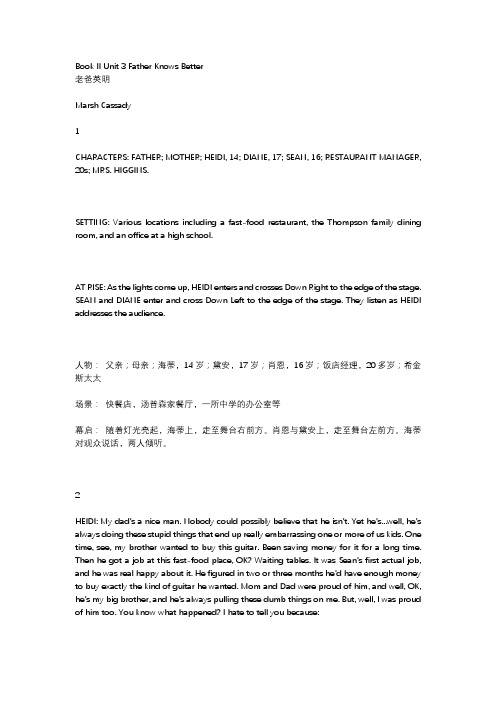
Book II Unit 3 Father Knows Better老爸英明Marsh Cassady1CHARACTERS: FATHER; MOTHER; HEIDI, 14; DIANE, 17; SEAN, 16; RESTAURANT MANAGER, 20s; MRS. HIGGINS.SETTING: Various locations including a fast-food restaurant, the Thompson family dining room, and an office at a high school.AT RISE: As the lights come up, HEIDI enters and crosses Down Right to the edge of the stage. SEAN and DIANE enter and cross Down Left to the edge of the stage. They listen as HEIDI addresses the audience.人物:父亲;母亲;海蒂,14岁;黛安,17岁;肖恩,16岁;饭店经理,20多岁;希金斯太太场景:快餐店,汤普森家餐厅,一所中学的办公室等幕启:随着灯光亮起,海蒂上,走至舞台右前方。
肖恩与黛安上,走至舞台左前方。
海蒂对观众说话,两人倾听。
2HEIDI: My dad's a nice man. Nobody could possibly believe that he isn't. Yet he's...well, he's always doing these stupid things that end up really embarrassing one or more of us kids. One time, see, my brother wanted to buy this guitar. Been saving money for it for a long time. Then he got a job at this fast-food place, OK? Waiting tables. It was Sean's first actual job, and he was real happy about it. He figured in two or three months he'd have enough money to buy exactly the kind of guitar he wanted. Mom and Dad were proud of him, and well, OK, he's my big brother, and he's always pulling these dumb things on me. But, well, I was proud of him too. You know what happened? I hate to tell you because:SEAN, DIANE and HEIDI: (In unison) Father knows better!海蒂:我老爸是个大好人。
新世纪大学英语综合教程2 unit3 单词讲解

on the side e.g. He sometimes does a bit of gardening on the side when he is short of money. 缺钱时,他有时兼职干点园艺活。 a new year’s resolution 新年决心 a second resolution 再次决定 a political resolution 政治决议
agent e.g. Agent: Good morning, sir. Can I help you? 中介:早上好,先生。请问有什么可以帮您? e.g. He is allegedly a police agent. 据传他是警方的密探。 e.g. an effective cleaning agent. 有效的清洁剂。
Success is the ability to go from failure to failure without losing your enthusiasm. Winston Churchill 成功就是能历经挫败而不是热情的能力。 温斯顿.丘吉尔 Try not to become a man of success but rather to become a man of value. Albert Einstein 不要做成功的人,而要做有价值的人。 阿尔伯特.爱因斯坦
contract
Collocations:
exchange contracts conclude/sign a contract 缔结/ 签订合同 carry out a contract 履行合同 break/violate a contract 违反合约 contract with… 与…的契约
abrahamlincoln始终要记住你对成功的信念比任何其他的事情都重要
综合英语教程第三版第二册Unit 4+5 课文重要词组单词
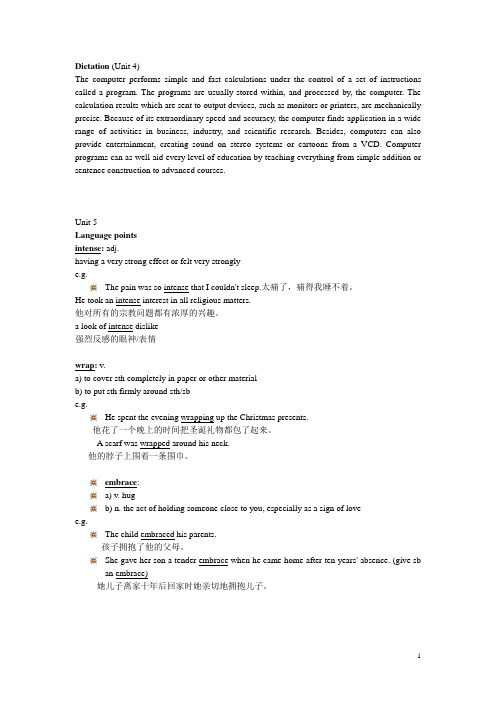
Dictation (Unit 4)The computer performs simple and fast calculations under the control of a set of instructions called a program. The programs are usually stored within, and processed by, the computer. The calculation results which are sent to output devices, such as monitors or printers, are mechanically precise. Because of its extraordinary speed and accuracy, the computer finds application in a wide range of activities in business, industry, and scientific research. Besides, computers can also provide entertainment, creating sound on stereo systems or cartoons from a VCD. Computer programs can as well aid every level of education by teaching everything from simple addition or sentence construction to advanced courses.Unit 5Language pointsintense: adj.having a very strong effect or felt very stronglye.g.The pain was so intense that I couldn't sleep.太痛了,痛得我睡不着。
全新版大学英语综合教程3(第二版)单词 课文背诵段落翻译及课后句子翻译
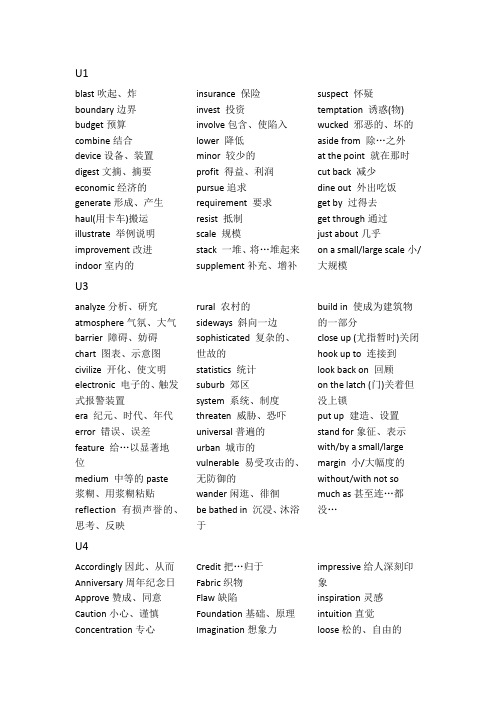
U1blast吹起、炸boundary边界budget预算combine结合device设备、装置digest文摘、摘要economic经济的generate形成、产生haul(用卡车)搬运illustrate 举例说明improvement改进indoor室内的insurance 保险invest 投资involve包含、使陷入lower 降低minor 较少的profit 得益、利润pursue追求requirement 要求resist 抵制scale 规模stack 一堆、将…堆起来supplement补充、增补suspect 怀疑temptation 诱惑(物)wucked 邪恶的、坏的aside from 除…之外at the point 就在那时cut back 减少dine out 外出吃饭get by 过得去get through通过just about几乎on a small/large scale小/大规模U3analyze分析、研究atmosphere气氛、大气barrier 障碍、妨碍chart 图表、示意图civilize 开化、使文明electronic 电子的、触发式报警装置era 纪元、时代、年代error 错误、误差feature 给…以显著地位medium 中等的paste浆糊、用浆糊粘贴reflection 有损声誉的、思考、反映rural 农村的sideways 斜向一边sophisticated 复杂的、世故的statistics 统计suburb 郊区system 系统、制度threaten 威胁、恐吓universal普遍的urban 城市的vulnerable 易受攻击的、无防御的wander闲逛、徘徊be bathed in 沉浸、沐浴于build in 使成为建筑物的一部分close up (尤指暂时)关闭hook up to 连接到look back on 回顾on the latch (门)关着但没上锁put up 建造、设置stand for象征、表示with/by a small/largemargin 小/大幅度的without/with not somuch as甚至连…都没…U4Accordingly因此、从而Anniversary周年纪念日Approve赞成、同意Caution小心、谨慎Concentration专心Credit把…归于Fabric织物Flaw缺陷Foundation基础、原理Imagination想象力impressive给人深刻印象inspiration灵感intuition直觉loose松的、自由的mess脏乱状态outbreak(疾病等)爆发presence出席、到场reality现实remarkable值得注意的、非凡的stimulate使兴奋、刺激strain使紧张、拉紧trifle少量、少许undermine暗中破坏、逐渐损害unify使成一体、使结合at the turn of the century在世纪初believe in认为(某事)是正确的、对…有信心beyond (any) doubt毫无疑问come to/reach aconclusion得出结论doze off打瞌睡if anything要说有什么区别的话in a row连续地(never) get anywhere/getnowhere一事无成not give/care a fig(forsb./sth.)对…毫不在乎U5Accord使符合、给予Amind在…当中Assemble集合、装配Considerate体贴的Diminish(使)变小Expose使暴露Gratitude感激Immerse使浸没Instance 实例、例子Marvelous不可思议的Quote引用、引述Repay偿还、报答Reverse交换…的位置Sincere诚挚的、真诚的Specific明确的、具体的Sprinkle将…洒在…上Statement陈述、声明Successive接连不断的、连续的Swift迅疾的、即时的Traditional传统的Undergo经过、经历Unload卸(货)、卸下Weep为…而哭泣And the rest等等At sea在海上航行Be exposed to暴露于、与…接触Be immersed in沉迷于Bring back回想起Get to sth./doing sth.开始认真思考(或做)Go about表现、忙于、着手In a flash一瞬间In part在某种程度上In quest of寻求、探求In secret秘密地、暗自In turn挨个地、轮流地Long for渴望On sb.’s behalf代表(某人)、为(某人)Put away把…收起、放好Take…for granted认为…是理所当然的Turn over考虑、思考Under way航行中、工作中U6Acute急性的、严重的Backward倒着Cling抓紧、抱紧Dreary沉闷的、阴沉的、使人忧郁的Endure忍耐、持续Fancy幻想Flutter飘动、晃动Fragile虚弱的、易碎的Joint共同的、共有的Masterpiece杰作、代表作Merry高兴的Mingle混合Mock嘲弄、取笑Nonsence废话、荒唐念头Persistent持续的、一再发生Scarcely几乎没有Sin罪孽、罪过Stalk潜行、可怕地蔓延Subtract减去、扣除Whistle吹口哨Be wet through湿透的Call to呼唤Cling to紧紧抓住For the rest至于其他Hear of听说、得知In a whisper低声地In tune和谐(地)Look the part看上去很像Pull up拉起Sit up坐起来Stand out显著、突出To excess过度Turn loose放手、放纵Wear away(时间)流逝、磨损课文翻译:I suspect not everyone who loves the country would be happy living the way we do. It ta kes a couple of special qualities. One is a tolerance for solitude. Because we are so busy and on such a tight budget, we don't entertain much. During the growing season there is no time for socializing anyway. Jim and Emily are involved in school activities, but they too spend mos t of their time at home. 我想,不是所有热爱乡村的人都会乐意过我们这种生活的。
综合英语 第二册 第三单元 词汇 短语 明细

综合英语第二册第三单元词汇短语明细Stroke (n): 中风举动举措撞击打击疾病等突然发作(vt&vi): 打字时击打键盘(vt):轻抚抚摸轻触待某人非常友好划掉敲击打击Helicopter (n):直升机Give someone a ride :让某人搭车Instructor (n):指导者教师Instantly (adv):立即立刻马上Wreckage (n):残片碎片残骸Gurney (n):(医院中推送病人用的)轮床邮件车Stare (v&n):凝视瞪视Insist on :坚持强调Spinal (a):脊柱的与脊柱有关的Psychiatrist (n):精神病专家精神病医生Intuition (n):直觉直觉力Fatal (a):致命的灾难性的重大的决定性的毁灭性的命中注定的宿命的Depressed (a):精神不振的消沉的忧伤的患抑郁症的经济萧条的降低了的Suicidal (a):想自杀的有自杀倾向的可能导致自我毁灭的Fascism (n):法西斯主义Fluent (a):熟练的流畅的流利的Subtitle (n):标题字幕Assistant (n):助手副手Striking (a):俊秀的突出的显著的抚媚动人的Miffed (n):稍有点恼火有点生气Temporary (a):临时的暂时的短时间的Eventually (adv):最后终于Poignant (a):悲惨的强烈的深刻的令人心碎的令人沉痛的Keep apart 使分开Slip (vi):滑倒滑动滑落时间不知不觉地过去健康状况等变差变坏下降下跌(vt):偷偷地塞给摆脱挣脱逃过被遗忘被忽视滑落悄悄疾行迅速放置下降陷入进入穿上脱下(a):滑动的可拆卸的(n):滑倒小失误差错遗漏纸条守场员年轻而瘦弱的人Be wrapped up in 埋头于被包藏于与…有关系Ego (n):自尊自负自我Station wagon(n):旅行车Stretch out 延伸绵延伸直满足需要Console (vt):安慰慰问Anguish (a):(尤指心理上的)极度的痛苦剧苦苦恼Diagnostic (a):诊断的判断的Surgery (n):外科手术外科学外科诊所门诊时间Malignant (a):恶毒的极想伤害别人的疾病恶性的极危险的致命的Authorize (vt):授权批准委托Deplorable (a):糟透的可叹的可悲的Beneficiary (n):受益人受贿人Manicure (n):修指甲Slur (vt):含糊的说出侮辱诋毁Believe in 相信信奉信仰信任赞成认为有益Therapist (n):治疗专家特定疗法治疗师Endure (v):忍受忍耐容忍持续持久坚持下去Epiphany (n):对事物真谛的领悟Inspire (v):鼓舞激励启迪Set apart 分开放隔离开留出拔出突出区别Move on 继续前进继续进行往前走对…采取行动出发离开。
- 1、下载文档前请自行甄别文档内容的完整性,平台不提供额外的编辑、内容补充、找答案等附加服务。
- 2、"仅部分预览"的文档,不可在线预览部分如存在完整性等问题,可反馈申请退款(可完整预览的文档不适用该条件!)。
- 3、如文档侵犯您的权益,请联系客服反馈,我们会尽快为您处理(人工客服工作时间:9:00-18:30)。
Unit-3
Language Points
have a high level of
(advanced)
tend to do sth
a set of marks
(the written language)
from the order in which they are placed
(by different arrangement in which these sounds are placed, human beings are able to know what these sounds mean)
vary:vi. if sth varies, it changes depending on the situation
vary (with sth) | vary (from sth to sth) | vary (between A and B)
vary from … to …
♦ e.g.
♦ 1. The results of the experiment varied wildly.
实验结果差异很大。
♦ 2. Prices vary with the seasons.
物价随季节而变动。
♦ 3. Her mood varied from optimism to extreme depression.
她的情绪由乐观一变而为极度消沉。
represent:vt. to be a sign or mark that means sth; to be a symbol of sth –synonym stand for; symbolize
e.g. Wind direction is represented by arrow.
They said that they represented the committee
interpret: a. vt. to believe that sth someone does or sth that happens has a particular meaning interpret sth (as sth)
e.g. We interpreted/translated his silence as a refusal.
我们认为他的沉默就是拒绝。
b. vt. to explain the meaning of sth
e.g. We interpreted/translated his silence as a refusal.
c.v. to translate one language into another as you hear it interpret (for sb)
♦try going up to …
♦all very well
♦(it’s better but…)
♦it‘s/that’s all very well, but ...spoken used to say that sth seems to be a good idea, but is not really possible or helpful(用于批评或反驳)某人尽可做某事;好倒是好(但并不完全令人满意)
♦ e.g. It's all very well the doctors telling me I've got to rest, but who's going to look after my children?
医生说我得去休息到容易,可是谁来照顾我的孩子呢?
fit in with:to live, etc. in an easy and natural way with sb/sth (与…)合得来;适应;
♦ e.g. His good mood fit in with the joyful occasion.
♦他良好的心绪与那欢快的场合很和谐。
end up:to be in a particular situation, state, or place after a series of events, especially when you
did not plan it 最终成为;最后处于end up doing sth
end up + noun
♦(die as sth)
e.g.
♦ 1. At first they hated each other, but they ended up getting married.
♦他们起初相互仇恨,到后来却成了夫妻。
♦ 2. You will end up in debt if you keep on spending money like that.
♦你要是老这样花钱,总有一天要负债。
♦keep sth (sb) away
♦in desperate need of …
♦(need very much)
desperate:a desperate situation is extremely bad , serious or dangerous 极严重的;既危险的;很危急的
e.g. a desperate illness/shortage/situation 绝症/奇缺/危局
♦desperate (for sth) | desperate (to do sth) : needing or wanting something very much 非常需要;极想;渴望
e.g. He was so desperate for a job he would have done anything.
Dictation
♦ A fisherman had caught a little fish. The poor creature begged him to throw it back again to the water, saying: “What is the use of catching me? I’m not large enough yet. Throw me back into the river, and you will catch me when I’m bigger. Then I shall be a fine dish for you.” The fisherman answered:” There’s no use of talking. If I let you into the water again, it is doubtful whether I may ever see you any more. You shall go into the frying pan and be fried this evening.” This fable illustrates an idea: A bird in the hand is worth two in the bush.。
